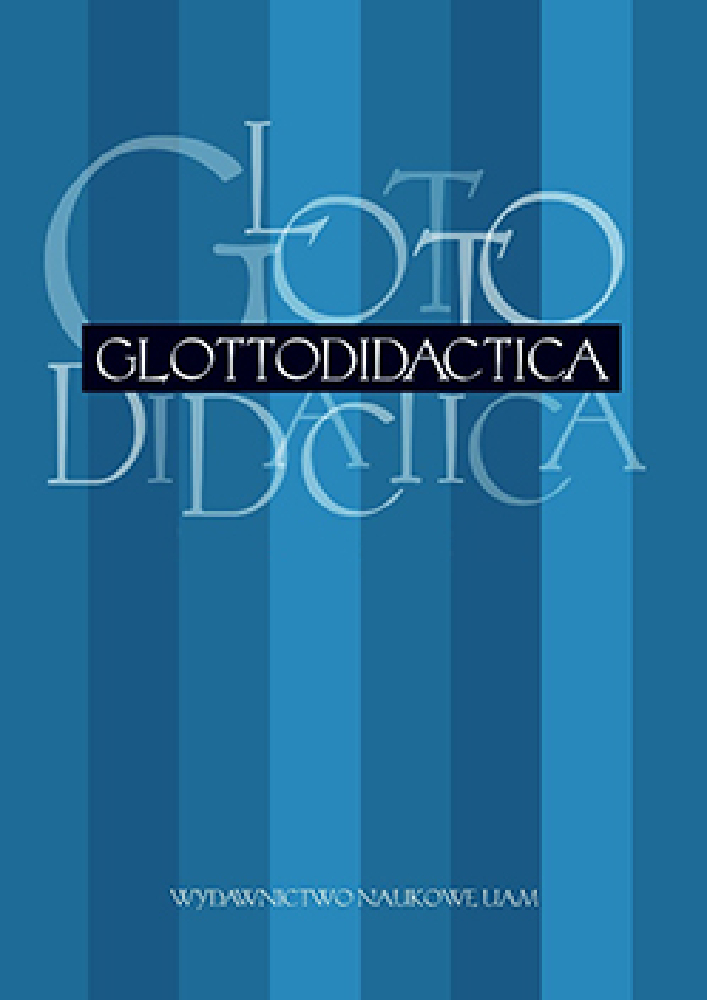Abstract
The paper discusses the challenges of foreign language teacher preparation in Slovakia and Poland resulting from observed tendencies such as digitalisation, mobility and specialisation of disciplines. The background for these reflections on the state of teacher training education is the document European Profile for Language Teacher Education – a Frame of Reference (2004) and DigComp 2.2 The Digital Competence Framework for Citizens (2022), which point out the main fields essential for the development of high-quality foreign language teachers in terms of digital, life and entrepreneurial competences. The authors of the paper analyze example curricula at two universities, one in Poland (Adam Mickiewicz University, Poznań) and one in Slovakia (Constantine the Philosopher University in Nitra) to answer the following research questions: how will future foreign language teachers be supported in developing their competences at the tertiary level? How do the current foreign language teacher training curricula at universities in Slovakia and Poland incorporate the need for the development of new competences? The results of the analysis present the discrepancies at both universities in the way the recommendations concerning competence development are incorporated, however they also reveal the weaknesses and strengths of the existing solutions.
References
Andrzejewska, E. (2008). Kompetencje nauczyciela języków obcych w edukacji wczesnoszkolnej. Języki Obce w Szkole, 4, 42–47.
British Council (2014). Vyučovanie angličtiny v slovenských školách. Bratislava: British Council Publishing.
Council of Europe (2007). European portfolio for student teachers of languages. A reflection tool for language teacher education. Strasburg: Council of Europe. http://archive.ecml.at/mtp2/fte/pdf/c3_epostl_e.pdf.
Council of Europe (2020). Common European Framework of Reference for Languages: Learning, teaching, assessment – Companion volume. Strasbourg: Council of Europe Publishing. https://www.coe.int/lang-cefr.
Enever, J. (2011). ELLIE – Early language learning in Europe. London: British Council.
Gadušová, Z, Harťanská, J. (2002). Teaching English in Slovakia – Past, Present and Future. CAUCE. Revista de filologia y si didactica, 25, 225–280.
Gill, S. (1995). Spotlight on… Slovakia. Modern English Teacher, 4, 66–70.
Jasiewicz, J., Filiciak, M., Mierzecka J., Śliwowski K., Klimczuk, A., Kisilowska, M, Tarkowski, A., Zadrożny, J. (2014). The framework catalogue of digital competences https://depot.ceon.pl/bitstream/handle/123456789/9069/The_Framework_Catalogue_of_Digital_Compe.pdf?sequence=1&isAllowed=y.
Kelly, M., Grenfell, M., Allan, R., Kriza, C., McEvoy, W. (2004). European profile for language teacher education – A frame of reference. http://www.lang.soton.ac.uk/profile/index.html.
Komorowska, H. (2017). Kształcenie językowe w Polsce. Warszawa: FRSE.
Kovacikova, E. (2021). The Profile of English teacher preparation in Slovakia. Nitra: UKF. DOI: https://doi.org/10.18355/PG.2021.10.2.3
OECD (2005). The definition and selection of key competences. Executive summary. https://bit.ly/1goiOUO.
Owens, T.L. (2017). Higher education in the sustainable development goals framework. European Journal of Education, 52 (4), 414–420. DOI: https://doi.org/10.1111/ejed.12237
Pokrivčáková, S. (2012). Modern Teacher of English. Nitra: ASPA.
Sala, A., Punie, Y., Garkov, V., Cabrera Giraldez, M. (2020). LifeComp: the European Framework for personal, social and learning to learn key competence. Luxemburg: Publications Office of the European Union.
Selvi, K. (2010). Teachers’ competencies. Cultura. International Journal of Philosophy of Culture and Axiology 7 (1), 167–175. DOI: https://doi.org/10.5840/cultura20107133
Vuorikari, R., Kluzer, S., Punie, Y. (2022). DigComp 2.2 The Digital Competence Framework for Citizens – With new examples of knowledge, skills and attitudes. Luxemburg: Publications Office of the European Union.
License
Copyright (c) 2023 Elena Kováčiková, Joanna Kic-Drgas

This work is licensed under a Creative Commons Attribution-NoDerivatives 4.0 International License.
Authors
Authors of texts accepted for publication in Glottodidactica are required to complete, sign and return to the Editorial team’s office the Agreement for granting a royalty-free license to works with a commitment to grant a CC sub-license.
Under the agreement, the authors of the texts published in Glottodidactica grant Adam Mickiewicz University in Poznań a non-exclusive, royalty-free license and authorize the use of Attribution-NoDerivatives 4.0 International (CC BY-ND 4.0) Creative Commons sub-license.
The authors retain the right to the free disposal of the work.
Users
Interested Internet users are entitled to use works that have been published in Glottodidactica since 2016, under the following conditions:
▪ attribution – obligation to provide, together with the distributed work, information about the authorship, title, source (link to the original work, DOI) and the license itself.
▪ no derivatives – the work must be preserved in its original form. Without the author's consent, it is not possible to distribute the modified work in the form of translations, publications, etc.
Copyrights are reserved for all texts published before 2016.
Miscellaneous
Adam Mickiewicz University in Poznań retains the property right as a whole (layout, graphic form, title, cover design, logo etc.).
Privacy statement
The names and email addresses published on this journal site will be used exclusively for the purposes declared by this journal and cannot be used for any other purpose or by any other party.





